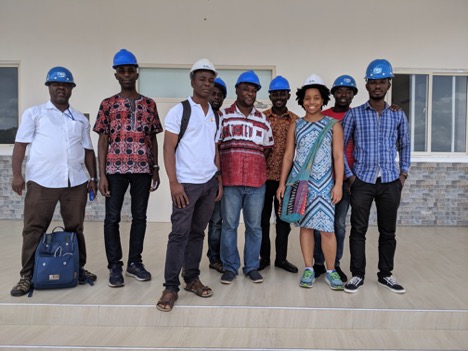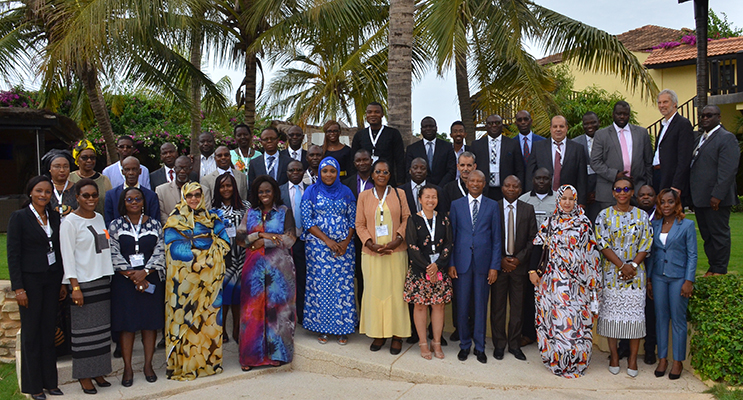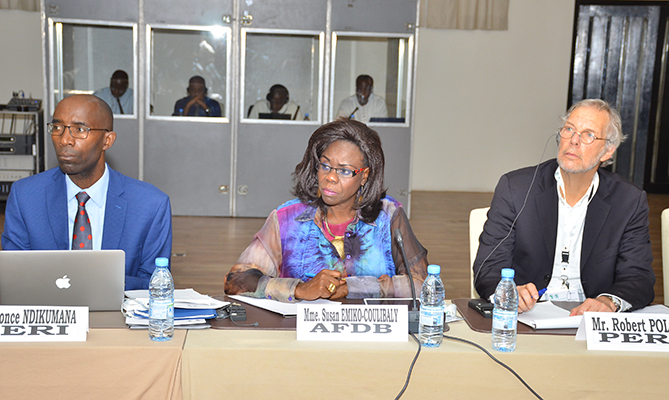Program Directors: Léonce Ndikumana and Lynda Pickbourn
PERI’s program on African Development Policy aims to conduct and disseminate applied and policy-oriented research on African economic development. It also leads PERI’s collaboration with other institutions in promoting capacity building for African policy makers through thematic workshops.
PERI-Carnegie-Corporation of New York Research Project on:
Capital Flight from Africa and Perverse Global Connections
As a 2021 Andrew Carnegie Fellow, Léonce Ndikumana received a generous grant from Carnegie Corporation of New York to support a research project on “Capital Flight from Africa and Perverse Global Connections: Evidence and Possible Solutions.” The project undertakes a quantitative assessment of capital flight, its mechanisms and impacts in three selected African countries – Cameroon, Ghana, and Zambia. It engages a historical and an institutional analysis of aspects of the global trade and financial systems that facilitate capital flight from these three countries. The analysis focuses on natural resource sectors in these countries to explore the extent to which these sectors are exposed to capital flight notably through trade misinvoicing, profit-shifting by multinational corporations that dominate the sectors, weaknesses in the domestic regulatory systems, and structural flaws in the global trade and financial systems. This project builds on previous country level analysis of capital flight, notably the studies on Angola, Côte d’Ivoire, and South Africa published in the volume edited Ndikumana and Boyce (2022) - On the Trail of Capital Flight from Africa: The Takers and the Enablers.
This Working Paper series presents the results from this project.
>> "Dark Spots in the International Commodity Value Chain: The Case of Copper in Zambia"
>> "Gold in Ghana: A Story of Unbalanced Exchange"
>> "Cocoa in Ghana, the 'Political Crop': Does State Control Shield the Cocoa Sector from Exposure to Capital Flight?"
>> "Capital Flight from Natural Resource-Dependent African Countries: Updated Estimates and Analysis for the Cases of Cameroon, Ghana, and Zambia, 1970-2021"
PERI-OSF Research Project on:
Capital Flight from Africa: Channels, Actors and Enablers
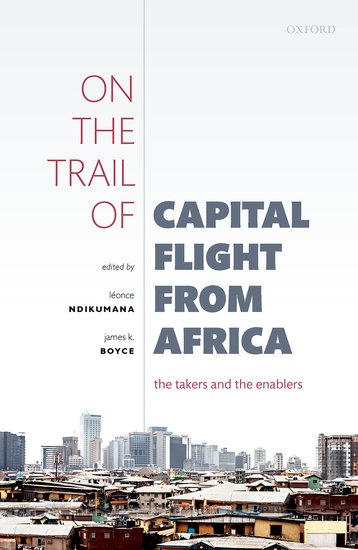 With generous support by the Open Society Foundations and the Friedrich Ebert Foundation, the African Development Policy Program at PERI initiated a research project aimed at filling the sizeable gaps in the existing literature to improve the understanding of the mechanisms, magnitudes and effects of capital flight from Africa. The Working Paper series presenting the results from this project culminated in the book, On the Trail of Capital Flight from Africa, which investigates the dynamics of capital flight from Angola, Côte d'Ivoire, and South Africa, countries that have witnessed large-scale illicit financial outflows in recent decades. Quantitative, qualitative, and institutional analysis for each country is used to examine the modus operandi of capital flight; that is, the 'who', 'how', and 'where' dimensions of the phenomenon.
With generous support by the Open Society Foundations and the Friedrich Ebert Foundation, the African Development Policy Program at PERI initiated a research project aimed at filling the sizeable gaps in the existing literature to improve the understanding of the mechanisms, magnitudes and effects of capital flight from Africa. The Working Paper series presenting the results from this project culminated in the book, On the Trail of Capital Flight from Africa, which investigates the dynamics of capital flight from Angola, Côte d'Ivoire, and South Africa, countries that have witnessed large-scale illicit financial outflows in recent decades. Quantitative, qualitative, and institutional analysis for each country is used to examine the modus operandi of capital flight; that is, the 'who', 'how', and 'where' dimensions of the phenomenon.
Léonce Ndikumana, member of the Sustainable Electricity-access Network for Africa (SEN-Africa)
The Sustainable Electricity-access Network for Africa (SEN-Africa) is a team of researchers from the University of Massachusetts Amherst, University of Ghana Legon, University of Nairobi and University of Cape Town, who are exploring practical mechanisms for fostering universal sustainable access to electricity in African countries. The team adopts a participatory and evidence-based approach that brings equity to the forefront, incorporating it, and other criteria, into modeling access to electricity in a way that reflects community preferences.
The objectives of the team’s research project are to: provide modeling and decision frameworks to support sustainable electricity access across Sub-Saharan Africa; develop a network of interdisciplinary researchers across multiple institutions in and outside of Africa; develop research directions grounded in the multiple stakeholder groups affected by electricity access decisions.
>> Click here for more information
PERI-OSF Research Project on:
Capital Flight from Africa: Channels, Actors and Enablers
Dissemination and Updates
December 26, 2018
Melvin Ayogu, James Henry and Léonce Ndikumana presented preliminary findings from the research project on “Capital Flight from Africa: Channels, Actors and Enablers” at the African Economic Research Consortium (AERC) in Nairobi on December 3, 2018 and at the African Economic Conference in Kigali on December 5, 2018.
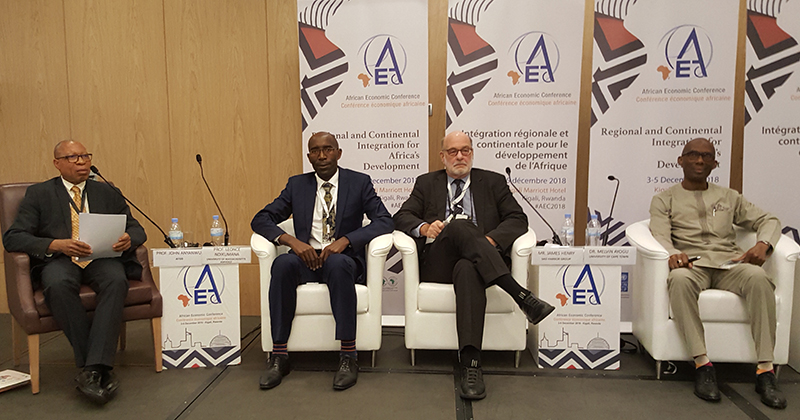
The problem of capital flight from African countries has generated substantial attention in academia and in the policy arena in light of mounting evidence of large and growing volumes of unrecorded resources fleeing a capital-starved continent, a region that lags behind others in terms of most development indicators. While the volume of capital flight from Africa may be small in absolute terms compared to other regions, it is large relative to the size of the continent’s economies, and it implies high opportunity costs arising from forgone domestic investment, long-term growth, social and human development. The problem of capital flight also raises serious concerns because of its implications for the quality of governance.
The existing evidence on capital flight from Africa remains inadequate, however, to provide a solid basis for the formulation of effective policies to achieve the dual goals of preventing further capital flight and inducing repatriation of past capital flight. First, the evidence is predominantly aggregate and does not furnish adequate country-specific information on the mechanisms of capital flight, the institutional context, and the role of various domestic and foreign players involved in facilitating capital flight. Second, the literature has not paid adequate attention to the issue of destinations of the wealth accumulated through capital flight and the role of the banking sector and public institutions in the destination territories. Third, the existing literature on capital fight has not sufficiently elaborated on the role of national and international institutions and governance for capital flight as well as the possible reverse relationship.
The research project led by the Political Economy Research Institute (PERI) and funded by the Open Society Foundation uses the cases of Angola, Côte d’Ivoire, and South Africa to present a combination of statistical and narrative investigation to deepen our understanding of the mechanisms, channels, actors and enablers of capital flight from the African continent. The ultimate goal is to help guide effective policy formulation on how to combat capital flight from Africa while also inspiring policy-relevant research on capital flight. The presentations by Melvin Ayogu, James Henry and Léonce Ndikumana shared preliminary results on the magnitudes of capital flight, the global architecture for capital flight (the “haven industry”), and the domestic and global institutional and governance factors that enable and facilitate capital flight from Africa. Some of the questions discussed in Nairobi and Kigali are: Why should policy makers and researchers care about capital flight from Africa? What are the modus operandi of capital flight; that is, the ‘who’, ‘how’, and ‘where’ dimensions of capital flight. ‘Who’ refers to major domestic and foreign players; ‘how’ refers to mechanisms of capital acquisition, transfer, and concealment; and ‘where’ refers to the destinations of capital flight and to bilateral transactions generating capital flight? What can be done to prevent capital flight from Africa and entice repatriation of the wealth held offshore?
The outcomes of the research project will be published in an edited volume, academic journals, working papers, magazines and other outlets. A working paper presenting the methodology for estimation of capital flight, the results and the analysis on the three country cases is available on PERI website: Magnitude and Mechanisms of Capital Flight from Angola, Côte d’Ivoire and South Africa
PERI and African Development Institute (ECAD) Host Capacity Building Workshop for African Policy Makers
Inclusive Finance and Domestic Resource Mobilization for Equitable and Sustainable Economic Development
October 12, 2018, Saly Portudal, Senegal
|
|
|
Access to finance and effective domestic resource mobilization are important prerequisites for sustainable development in Africa. For African countries to accelerate progress towards the 2023 sustainable development goals (SDGs), it is imperative to design effective strategies for scaling up development financing to boost growth, fuel industrialization and economic transformation, and improve the living standards of the population.
Today domestic resource mobilization (both public and private) remains low and below potential in most African countries. Moreover, a large fraction of people in most African countries remain financially excluded: they lack access to modern means of savings, credit, and payments. Despite recent gains, especially thanks to mobile banking technology, the gaps in access to finance remain large especially in rural areas. Even in areas where financial services are accessible, they remain expensive, which discourages consumption, investment, job creation, and private sector development.
The African Development Bank (AfDB) and the Political Economy Research Institute (PERI) joined hands to organize a workshop in Saly, Senegal, on October 8-12, 2018, where 39 senior government and central bank officials from fifteen francophone African countries discussed the role of inclusive finance and domestic resource mobilization as drivers of equitable and sustainable economic development in Africa. The workshop explored strategies to improve government revenue mobilization and enhance the efficiency of financial systems to increase access to finance, especially for small and medium enterprises, improve the allocation of investment capital into high-growth and employment-generating activities, and stimulate economic transformation, green growth, and poverty reduction.
The workshop covered the following themes:
• Financial inclusion, domestic investment and employment creation
• Financing small and medium enterprises (SMEs), youth- and women-owned enterprises.
• Development banks and sustainable development
• Inclusive finance and green growth
• Corporate taxation and domestic resource mobilization
• Domestic resource mobilization in natural resource-rich economies
• Domestic resource mobilization, capital flight and illicit financial flows
PERI was represented by Robert Pollin and Léonce Ndikumana. The African Development Bank was represented by Susan Emiko and Kamaria Badirou.
PERI's Léonce Ndikumana Presents Paper at High Level Policy Dialogue in Dakar, Senegal
Effective Aid for Inclusive Development in Sub-Saharan Africa: A Look From the Ground Up
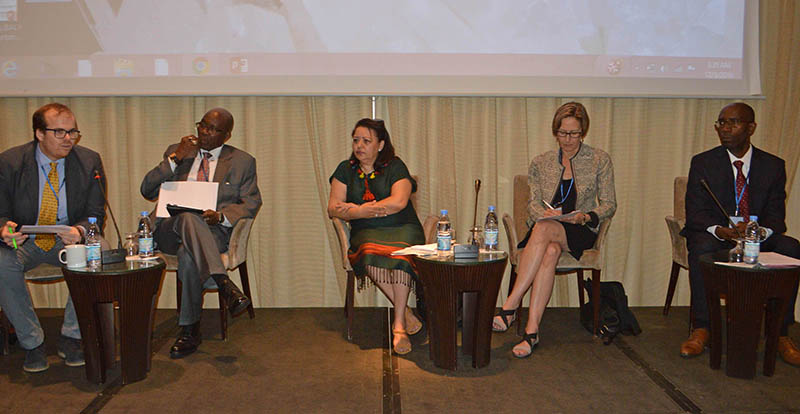
Existing development research on sub-Saharan Africa suggests that the most useful insights on the question of effectiveness in development assistance emerge from the micro level. This poses a major challenge for the design and implementation, based on reliable evidence, of development actions in a terrain as vast and varied as Sub-Saharan Africa. The imperative to ‘leave no one behind’ – sanctioned by the pledge by UN members in the Agenda 2030, and the African Union’s Agenda 2063 – imposes an unprecedented effort to support quality, context-specific, empirical knowledge on inclusion, and new ways to leverage and share this knowledge with the twin goal of supporting both more effective development assistance, and more effective national policies.
The Global Development Network (GDN) and the African Economic Research Consortium (AERC) convene a half day policy dialogue bringing together high level policy makers, top representatives of aid agencies, and senior African researchers to address some of the questions below:
Has development assistance been effective in supporting the inclusion agenda in SSA, so far? What has the role of knowledge and evidence been in the past, and what should be the next research priorities? How should development assistance work, across new and old donors, to support fact-based policy making at the national level? How can local researchers and aid institutions, across new and old donors, work together to support the inclusion agenda in sub-Saharan Africa?
PERI and African Development Institute (ECAD) Host Capacity Building Workshop for African Policy Makers
Inclusive Finance for Equitable and Sustainable Economic Development
November 2016, Nairobi, Kenya
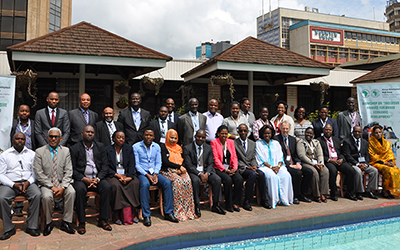
Access to finance is an important prerequisite for sustainable development and improvement in the living standard of the majority of the population. Today, a large fraction of the African people does not have access to modern means of savings, credit, and long-term investment finance. Less than 30 percent of the African adult population have an account at a formal financial institution. Under this measure, access to finance ranges from less than 2% in Nigeria to 80% in Mauritius. Despite recent gains due partly to penetration of mobile banking technology, the gaps in access to finance remain large especially in the rural area and in the informal sector generally. Moreover, even when they are accessible, financial services remain onerous, which discourages private sector activity and may even expose households to financial distress.
To facilitate a policy discussion on this important topic, the African Development Institute of the African Development Bank and the Political Economy Research Institute (PERI) organized a workshop for senior African policy makers on “Inclusive Finance for Equitable and Sustainable Economic Development” in Nairobi, Kenya from November 14 to 18, 2016. The workshop provides African policy makers with an opportunity to share their experiences on progress made as well as challenges encountered in their countries in promoting financial inclusion as a driver of inclusive economic development. The discussion explores strategies to manage and regulate the financial system (the banking sector and non-bank institutions) to increase access to finance, improve the allocation of investment capital into high-growth and employment-generating activities, and enhance the role of the financial system in economic transformation, growth, and poverty reduction.
The following themes were discussed in the workshop:
Module 1: Access to finance in Africa over time and relative to other regions
Module 2: Inclusive finance and poverty reduction
Module 3: Financial inclusion, domestic investment and employment creation
Module 4: Financing small and medium size enterprises, youth- and women-owned enterprises
Module 5: Legal and regulatory framework for financial inclusion
Module 6: National development banks and financial inclusion
Module 7: Development central banking and financial inclusion
Module 8: Inclusive finance and green growth
PERI was represented by Robert Pollin and Léonce Ndikumana.
Capital Flight from Africa: Causes, Effects and Policy Issues
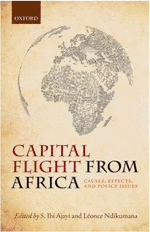 Capital flight is a critical challenge to economic development in African countries. While Africa receives a substantial amount of capital inflows in the form of official development assistance, external borrowing and foreign direct investment, it also suffers a heavy financial hemorrhage through capital flight.
Capital flight is a critical challenge to economic development in African countries. While Africa receives a substantial amount of capital inflows in the form of official development assistance, external borrowing and foreign direct investment, it also suffers a heavy financial hemorrhage through capital flight.
S. Ibi Ajayi (University of Ibadan) and Léonce Ndikumana (Director of PERI's Africa Policy Program) have edited a new collection of analysis of capital flight from Africa with Oxford University Press. The book is available here. Select chapters are available as PERI Working Papers. Read them here:
"Capital Flight and Monetary Policy in African Countries," by Hippolyte Fofack and Léonce Ndikumana
"Capital Flight: Measurement and Drivers," by Léonce Ndikumana, James K. Boyce and Ameth Saloum Ndiyae
"Governance and Illicit Financial Flows," by Melvin D. Ayogu and Folarin Gbadebo-Smith
"Illicit Financial Flows and Stolen Assets Value Recovery," by Melvin D. Ayogu and Julius Arbor
"Capital Flight and Poverty Reduction in Africa," by Janvier D. Nkurunziza
"Strategies for Addressing Capital Flight," by James K. Boyce and Léonce Ndikumana
Savings, Capital Flight, and African Development
Historically, countries that have achieved and sustained high growth rates maintained high domestic saving rates, enabling domestic investment and job creation. But saving in African countries has remained low, leading to high investment-savings gaps, and increased dependence on external capital. This analysis by Léonce Ndikumana, Director of PERI's African Development Policy Program, suggests that strategies to address domestic savings should include policies to curb and prevent further capital flight (the leakage of financial resources) from Africa, the levels of which have exploded over the past decade. This paper is forthcoming as a chapter in Handbook of Africa and Economics, edited by Celestin Monga and Justin Y. Lin (Oxford University Press).


